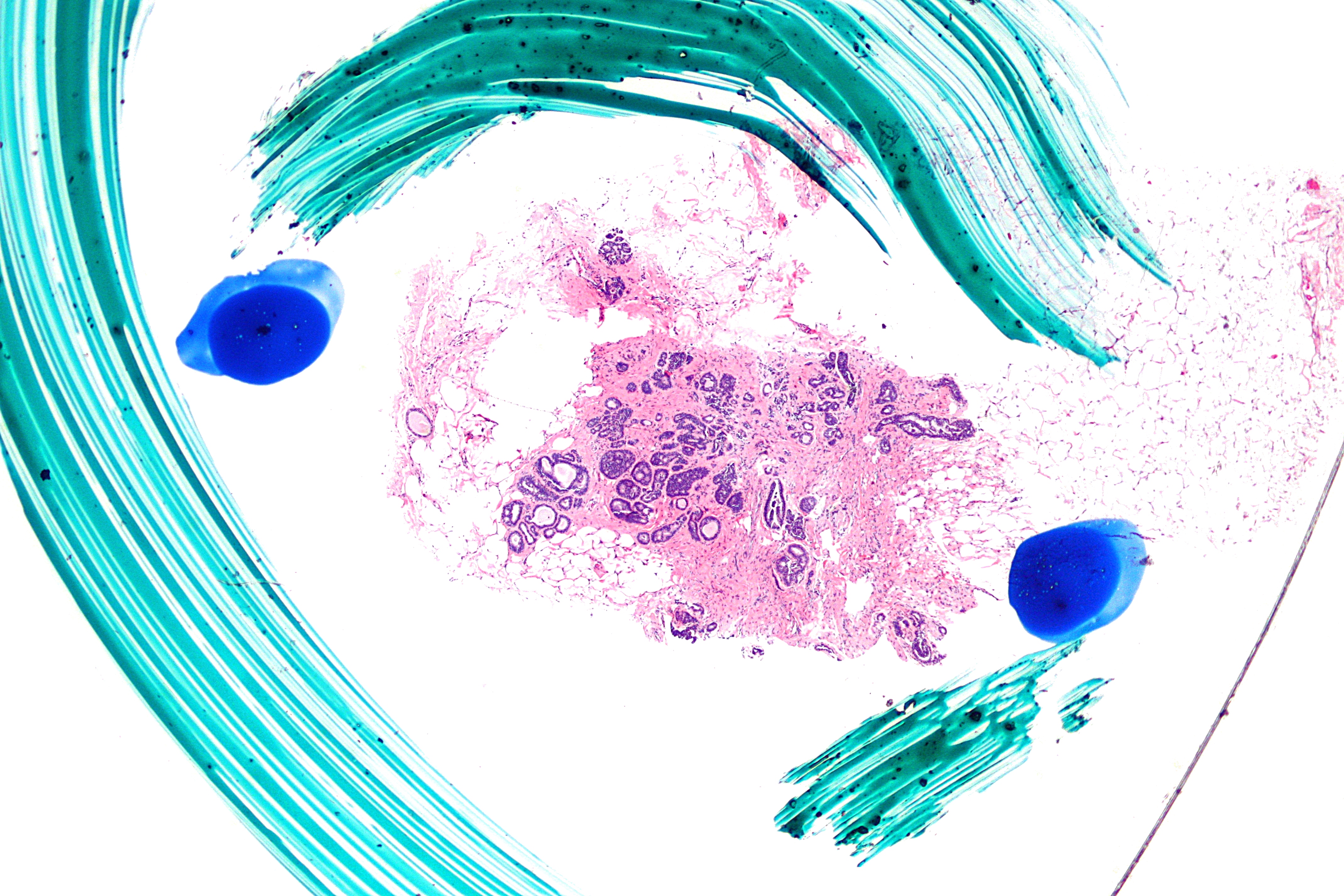Atypical ductal hyperplasia
Editor-In-Chief: Prab R Tumpati, MD
Obesity, Sleep & Internal medicine
Founder, WikiMD Wellnesspedia &
W8MD medical weight loss NYC and sleep center NYC
| Atypical ductal hyperplasia | |
|---|---|

| |
| Synonyms | ADH |
| Pronounce | N/A |
| Specialty | N/A |
| Symptoms | Often asymptomatic, may be detected on mammography |
| Complications | Increased risk of breast cancer |
| Onset | Typically diagnosed in women aged 40-60 |
| Duration | Chronic |
| Types | N/A |
| Causes | Abnormal proliferation of ductal epithelial cells |
| Risks | Family history of breast cancer, hormone replacement therapy |
| Diagnosis | Biopsy, histopathology |
| Differential diagnosis | Ductal carcinoma in situ, usual ductal hyperplasia |
| Prevention | Regular mammograms, lifestyle modifications |
| Treatment | Surveillance, surgical excision |
| Medication | Tamoxifen or other selective estrogen receptor modulators |
| Prognosis | Good with monitoring, but increased risk of breast cancer |
| Frequency | Found in approximately 5-10% of breast biopsies |
| Deaths | N/A |
Atypical Ductal Hyperplasia (ADH) is a condition characterized by the abnormal proliferation of cells within the milk ducts of the breast. It is considered a precancerous condition, meaning that while it is not cancer, it has the potential to develop into a more serious form of breast cancer if left untreated. ADH is often discovered during a mammogram as part of routine breast cancer screening or following an investigation of a breast lump.
Diagnosis[edit | edit source]
The diagnosis of ADH is typically made through a combination of imaging tests and a biopsy. Imaging tests, such as a mammogram or ultrasound, can identify areas of abnormal tissue in the breast. However, a definitive diagnosis requires a biopsy, where a small sample of breast tissue is removed and examined under a microscope by a pathologist. The presence of atypical cells that have not spread outside the ducts characterizes ADH.
Risk Factors[edit | edit source]
Several risk factors are associated with the development of ADH, including age, family history of breast cancer, personal history of breast lesions, and certain genetic mutations. Women with ADH have an increased risk of developing breast cancer in the future, making it important to identify and monitor this condition early.
Treatment and Management[edit | edit source]
The treatment for ADH often involves surgical removal of the affected tissue, typically through a procedure known as a lumpectomy. In some cases, particularly when ADH is found alongside other high-risk conditions, more extensive surgery may be recommended. Following surgery, patients are usually advised to undergo regular breast cancer screening to monitor for the development of invasive cancer.
Prognosis[edit | edit source]
While ADH itself is not cancer, it indicates an increased risk of developing breast cancer in the future. With appropriate treatment and monitoring, the prognosis for individuals with ADH is generally good. Early detection and management of ADH are crucial for preventing the progression to more serious forms of breast cancer.
See Also[edit | edit source]
Search WikiMD
Ad.Tired of being Overweight? Try W8MD's physician weight loss program.
Semaglutide (Ozempic / Wegovy and Tirzepatide (Mounjaro / Zepbound) available.
Advertise on WikiMD
|
WikiMD's Wellness Encyclopedia |
| Let Food Be Thy Medicine Medicine Thy Food - Hippocrates |
Translate this page: - East Asian
中文,
日本,
한국어,
South Asian
हिन्दी,
தமிழ்,
తెలుగు,
Urdu,
ಕನ್ನಡ,
Southeast Asian
Indonesian,
Vietnamese,
Thai,
မြန်မာဘာသာ,
বাংলা
European
español,
Deutsch,
français,
Greek,
português do Brasil,
polski,
română,
русский,
Nederlands,
norsk,
svenska,
suomi,
Italian
Middle Eastern & African
عربى,
Turkish,
Persian,
Hebrew,
Afrikaans,
isiZulu,
Kiswahili,
Other
Bulgarian,
Hungarian,
Czech,
Swedish,
മലയാളം,
मराठी,
ਪੰਜਾਬੀ,
ગુજરાતી,
Portuguese,
Ukrainian
Medical Disclaimer: WikiMD is not a substitute for professional medical advice. The information on WikiMD is provided as an information resource only, may be incorrect, outdated or misleading, and is not to be used or relied on for any diagnostic or treatment purposes. Please consult your health care provider before making any healthcare decisions or for guidance about a specific medical condition. WikiMD expressly disclaims responsibility, and shall have no liability, for any damages, loss, injury, or liability whatsoever suffered as a result of your reliance on the information contained in this site. By visiting this site you agree to the foregoing terms and conditions, which may from time to time be changed or supplemented by WikiMD. If you do not agree to the foregoing terms and conditions, you should not enter or use this site. See full disclaimer.
Credits:Most images are courtesy of Wikimedia commons, and templates, categories Wikipedia, licensed under CC BY SA or similar.
Contributors: Prab R. Tumpati, MD




